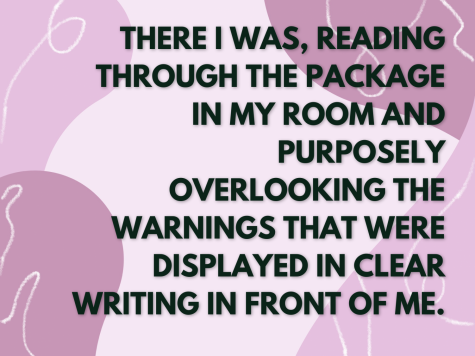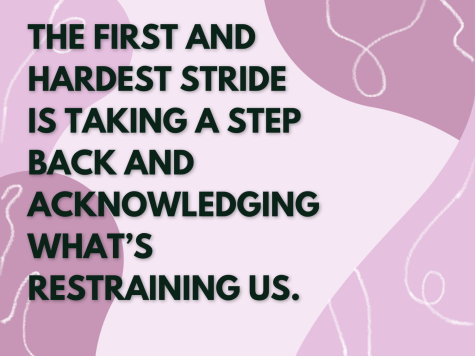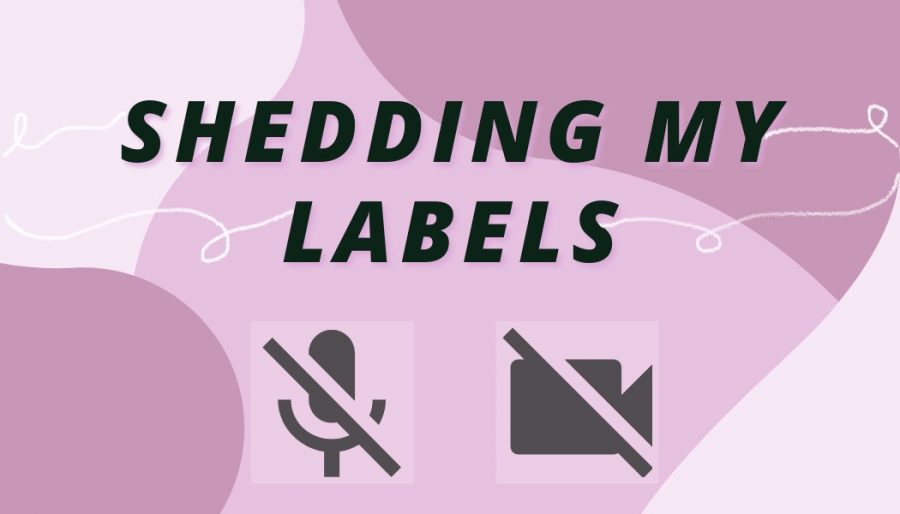Shedding my labels
Finding the silver linings of staying home by breaking through my introversion
Finding the silver linings of staying home by breaking through my introversion
February 12, 2021
“I hate people.”
This is a phrase I’ve continuously told my friends throughout my three and a half years in high school. I know it sounds dense and dismissive, but I never meant it as a way to sound eccentric. Those three words felt like the only accurate representation of the desolation I felt after a typical six to seven hour school day. To me, spending every hour interacting with others was a chore, and I’d feel like I had reached my limit on social interactions by lunch every day. I could even feel the energy leaving my body simply by standing or sitting in a classroom surrounded by lots of other people.
Early on in high school, I had pretty much given myself the label “introvert.” My preference to write down my thoughts rather than talk and my inclination to spend time alone with my thoughts were qualities that convinced me of my introversion. And so when the possibility of school closure was first mentioned, I felt a sliver of hope — hope that attending school wouldn’t feel as draining. In the weeks leading up to the announcement of our school closure, I would frustratedly rant to my parents daily about why school should be online already.
Worst part was, my main reason for wanting school closure wasn’t for safety reasons; rather, because I wanted a break from the stress of in-person interactions. And when we received the email regarding school closure last March, my first thought was, “Oh my goodness. Finally.” I was relieved, and above all, excited, that I could spend more time in my room, a constant safe space for me. I felt assured and knew that I wouldn’t just be OK with distanced learning and staying home — I would be thriving.
The first few months of quarantine were a positive experience. The remote learning schedule during the spring was amazing: I grew closer with my older sister, binged new shows and simply had more time to myself. It’s funny — a few weeks into shelter-in-place, El Estoque published a package titled “Introversion and Extraversion,” and one specific story unpacked the dangers of

encouraging introvert-extrovert labels and stereotypes. There I was, reading through the package in my room and purposely overlooking the warnings that were displayed in clear writing in front of me.
By mid-summer, I started to realize I hadn’t had a full conversation with my friends in weeks, or even months. Once everything went online, communication with my friends and me plunged along with interactions with my peers during class. We’d send each other occasional memes or videos, but that was basically it. But I didn’t mind our rare interactions, because I really did value the time to myself.
Fast forward to the first semester of this school year, however, and things got significantly harder, which I’m sure many others can relate to. My mental health was being challenged every single day, and the amount of social interaction during Zoom classes and with my friends just wasn’t cutting it.
But isn’t that also what I had hoped for? Isn’t that what all my rants were about? Wasn’t I, a proud introvert, supposed to be having the time of my life while being isolated at home? It was hard to acknowledge that I missed talking to my classmates, as well as conversations with my friends that would end in wheezing and laughing, but I needed reassurance from others that I wasn’t the only one struggling mentally during this time or dealing with an awful sleep schedule.
I guess a part of me felt guilty for going back on my words. I didn’t want to break out of my introverted shell, because this label was the one I went into shelter-in-place with, and for so long I believed that it defined who I was. I’ve heard teachers, peers, friends and family members complain (and rightfully so) that every day feels like the same day repeating over and over again, to the point where they feel burnt out or mentally drained. And though I fortunately haven’t experienced that feeling so far, I somehow convinced myself that other challenges that I faced as a result of staying home for so long weren’t as valid. I was set on the idea that I just needed to accept the harsh reality without speaking up — or what people would expect an introvert to do.
But eventually, I felt like I had reached a point where I realized that justifying my introversion wasn’t worth it, especially in the face of loneliness during the pandemic. There was never a specific moment that sparked this change, but as I started taking baby steps towards stepping out of my comfort zone, by staying unmuted, participating more in breakout rooms and keeping my camera on more than before, I learned to slowly stop categorizing my personality and hiding behind the label. I couldn’t continue to hide behind the mask of an introvert — submitting to my awkwardness during breakout rooms and putting in little effort to talk to my friends did more harm than good.
It’s still a work in progress, but at least now I can happily say that breakout rooms aren’t as dreadful as I once thought they were, and I Zoom with my friends almost every night to work on homework together, talk about our lives or stream a movie or show. Whether it’s our own ramen night or watching our favorite show at the moment, I genuinely have something to look forward to now. Not to mention that even breakout rooms have given me a sense of normalcy.
While everyone does have different experiences handling our current circumstance, and as cheesy and

overemphasized this may be, there are silver linings regardless of who we are and what our personalities are like. The first and hardest stride is taking a step back and acknowledging what’s restraining us.
Sure, I sometimes find myself not participating in discussions as much as I should be, or avoiding my messages a few days in a row because there are still times when I feel drained, but I’ve definitely found a better balance. Whenever I now look back on the “Introversion and Extraversion” package, I’m reminded that I no longer rely on my introversion as an excuse, and I realize that I do need some levels of social interaction to thrive.

















